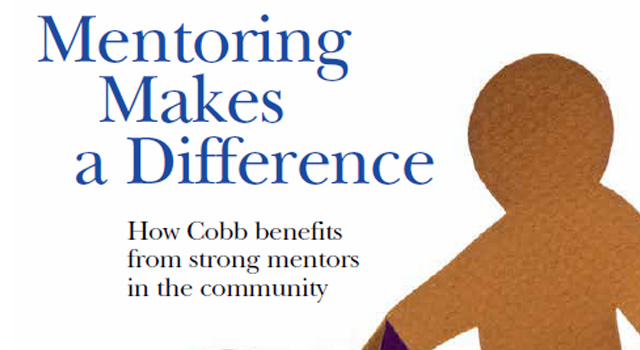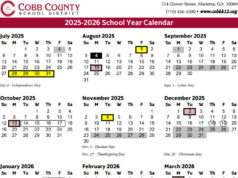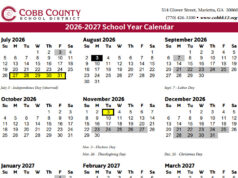How Cobb benefits from strong mentors in the community
Executive Director of Marietta Mentoring for Leadership M. Marjorie Kellogg says it’s proven that students who engage in quality mentoring programs graduate at higher rates and have less truancy, drug use or other risky behaviors. “Our graduation rate is 87 percent compared to a state rate of about 68 percent,” she adds. “A consistent, caring mentor can help alleviate issues of homelessness, poverty and neighborhood issues that many of our children face.”
When a child feels they’re not alone in dealing with day-to-day situations, they’re better able to forward themselves in their education, social and home values and in their future. According to a Ventures study by Big Brothers Big Sisters, students who meet regularly with their mentors are 52 percent less likely than their peers to skip a day of school and 37 percent less likely to skip a class. The same study found that youth who met with mentors regularly were 46 percent less likely than their peers to start using illegal drugs and 27 percent less likely to start drinking. Supporting daily living means more to children and teenagers than may be perceived; 40 percent of a teenager’s waking hours are spent without companionship or supervision.
“Mentors serve as a prevention and intervention strategy and reduce the risk factors that inhibit young people’s ability to learn in the classroom and at home,” says Maryellen Gomes, mentor coordinator and school social worker for the Cobb County School District. Gomes works with Cobb Mentoring Matters, which serves students K–12 in Cobb County Schools and places mentors in the 112 schools within the district. “The unique aspect of the program is that it is mentor driven, meaning mentors choose the school that they wish to serve in,” she adds.
The Impact of Mentoring
Of the students participating in Mentoring for Leadership, 85 percent are from extremely low-income families; 80 percent are from single parents; 22 percent live with a guardian other than a parent; and 17 percent have been homeless at some time in the last two years. Mentors are matched based on gender, common interests and similar career aspirations, as well as, whenever possible, similar background and culture. Through mentoring, students also work in group activities to further their understanding of the school curriculum and community, grow socially and learn team building and leadership skills.
“Cobb Mentoring Matters was created to address the needs of students in Cobb County Schools and is currently the only district wide mentoring program,” Gomes says. “Our mission is to empower at-risk youth in our community to make positive life choices that maximize their personal potential. We accomplish this by matching and placing our students in a one on one relationship or in a group match of 2–4 students.” On their website, cobbmentoringmatters.org, they invite members of the community to “pay it forward” in a list of 10 reasons to become a mentor. With the belief that one organization cannot do it all, collaboration is key to their success. Internally, it begins with working with several departments within the district — the school counselors, social workers, teachers, PTA and school parent counsel groups are the first line of defense.
Externally, they’ve partnered with several faith-based organizations and civic organizations that have provided mentors, and Gas South has continued to provide support through sponsoring End of the Year activities, as well as training sessions for their mentors throughout the year. “The research is conclusive that youth with mentors are more likely to report positive behaviors and less likely to report negative ones; young people believe mentoring provides them with support and guidance to lead productive lives; and the field of mentoring has grown significantly but a mentoring gap exist, so we still have much to do!” Gomes says.
The Mentoring for Leadership program began with only 20 students and currently serves an average of 75 and Kellogg believes mentoring teaches young adults to advocate for themselves — a survival skill that can help them work through difficult life situations. She matches students of high potential and low support with a community mentor who can guide and encourage students to excel in school, graduate on time and go on to college or a career. They work with Marietta City Schools, Life University, First United Methodist Church, Leadership Cobb and Walton Communities. And Mentoring for Leadership’s success is shown in their students: 80 percent of students who have participated in the program improved their grades, report that they have learned from their mentors and say they have learned valuable skills like how to be respectful, work as a team, make honor roll and never give up.
Becoming a Mentor
Anyone interested in becoming a mentor can apply online at mentoringforleadership.org. A training program and background check are the next steps. “Once they are matched with an individual student, they participate in organized monthly activities that encourage collegiality and foster academic and social growth in the students,” Kellogg says. “They also arrange outings just to go out for a coke or a hike so they can chat.” A similar process exists for Cobb Mentoring Matters; on their website, click “I want to be a Mentor” and you’ll be contacted within 24 hours. After filling out an application and a 90-minute orientation, you’ll be asked for two references, fingerprints and, once cleared, you’ll be given a badge to begin the student matching process. Mentors with Cobb Mentoring Matters are asked to commit to one school year with their mentee for only one hour per week at the school.
“Mentors serve as a prevention and intervention strategy and reduce the risk factors that inhibit young people’s ability to learn in the classroom and at home,” Gomes says. “Our hope is that mentors can also connect with their mentee’s parent and teacher to discuss how they can assist with issues at home or with school work. We want them to have fun and hopefully develop a relationship that will continue throughout the students education and maybe beyond!”

















I would like to be a mentor. I’ve owned a business for the last 20 years and have recently retired. 63 and energetic.